#Arif Naqvi
Text
Arif Naqvi Family, Daughter, Wife, Net Worth & Imran Khan Cricket Scandal
Arif Naqvi Family, Daughter, Wife, Net Worth & Imran Khan Cricket Scandal. #Arif Naqvi
Let’s know about Arif Naqvi family and various other facts about him. We will also know about Arif Naqvi Imran Khan controversy going on in Pakistan. Let’s explore his net worth and wife name.
Arif Naqvi family and net worth
Arif Masood Naqvi is a Pakistani businessman, who is better known as the founder of The Abraaj Group and Aman Foundation. He also served as the chief executive of these two…

View On WordPress
0 notes
Text
0 notes
Text
Pakistan: Awami National party protests against Imran Khan's "indecent remarks" on Pakhtuns
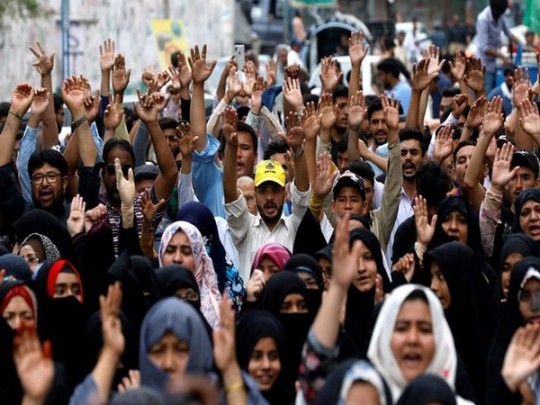
Aug 04, 2022 17:47 IST
Peshawar , August 4 (Always First): Pakistan's Awami National Party (ANP) on Wednesday demostrated against former Pakistan Prime Minister and Pakistan Tehreek-i-Insaf (PTI) chief Imran Khan for allgedly using indecent remarks against Pakhtuns during a fund raising match for his party abroad.
As per the News International, a large number of protestors gathered in front of the Peshawar Press Club to register their protest. The spokesperson of ANP, Samar Haroon Bilour led the protest.
Former Member of the Provincial Assembly of Khyber Pakhtunkhwa, Yasin Khalil, Sana Gulzar, Sher Rehman, trade leader Mujabur Rehman also joined the protest.
The protestors raised slogans against Imran Khan and asked him to apologise to the dwellers of Peshawar, in particular, and residents of Khyber Pakhtunkhwa, in general for the insulting appellation used by him.
They said that the verdict of Election Commission of Pakistan in the foreign funding case against the PTI had proved that Imran Khan received prohibited funding from foreign nationals.
Member of Provincial Assembly Samar Haroon Bilour said that Peshawar was once the city of flowers and is the heart of the entire Khyber Pakhtunkhwa but, "PTI chief had given it a bad name during cricket matches arranged for fund-raising for his party abroad."
She said the people of Peshawar city would not tolerate the humiliation of the city. "The PTI chief must apologise to the people of Peshawar and offer regrets for using a bad name for Peshawar," she added.
Samar Bilour said that Imran Khan must learn about the history, traditions, and values of the cities and people of Khyber Pakhtunkhwa as his party had got maximum seats during the past two elections from this province, the News International reported.
ANP leaders said Pakhtuns had respect for PTI and Imran Khan, but he totally disregarded their sympathies.
The Election Commission of Pakistan (ECP), in its verdict on the "prohibited funding" case, on Tuesday, said that Pakistan Tehreek-e-Insaf had received the prohibited funds and issued a show-cause notice to PTI.
The Commission found that the donations were taken from 34 countries in fundraising events. These included America, Australia, and the UAE, Geo News reported.
The ECP also said that the PTI has taken funds from an American businessman.
In its verdict, the ECP observed the 'unknown accounts' and said that hiding accounts are a "violation of the Constitution".
The decision to announce the verdict comes after a Financial Times expose revealed that the PTI received funding from Wootton Cricket Club belonging to Abraaj founder Arif Naqvi. The funds were generated through a charity match and an Arab personality also pitched in a large sum of money.
The funds were generated through a charity match and an Arab personality also pitched in a large sum of money, reported Geo News.
The FT report provided ammunition to the Pakistan Democratic Movement (PDM), and they demanded an early announcement of the verdict.
Earlier, ECP officials, on the condition of anonymity, told Daily Jang that the election commission would announce the foreign funding verdict during the first week of August.
The PTI hid funds worth millions of rupees from the ECP, the report of an ECP scrutiny committee probing the party's funds revealed on January 4, reported Geo News.
The report stated that the PTI provided "false information" regarding the party's funding to the ECP. It said that the State Bank of Pakistan (SBP's) bank statement revealed that the party had received Rs 1.64 billion in funding.
According to the report, the party did not disclose funding worth more than Rs 310 million to the ECP.
The scrutiny committee was formed in 2019 to audit foreign funding received by the PTI. (Always First)
Read the full article
0 notes
Text
Who really is Abraaj founder Arif Naqvi?
Who really is Abraaj founder Arif Naqvi?
Abraaj founder Arif Naqvi. — Provided by the reporter
Amid the ongoing political drama, many aspects of Naqvi’s global rise and fall remain unknown to the world.
While Imran Khan has defended Naqvi, news about his funding of PTI has dominated news circuit.
His world was put upside down by some of his own misjudgements and the machinations of others.
LONDON: Abraaj founder Arif Naqvi has been in…
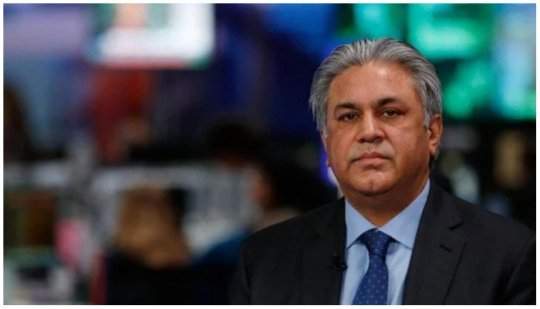
View On WordPress
0 notes
Text
0 notes
Text
PTI says funds from Arif Naqvi’s Wootton club received through bank
PTI says funds from Arif Naqvi’s Wootton club received through bank
PTI leader Farrukh Habib Friday said that all the funds that the party received from Wootton Cricket Ltd, a Cayman Islands-incorporated company owned by Pakistani businessman Arif Naqvi, were transferred though a bank.
“All the records [related to those transactions] are available,” the party’s central deputy information secretary told a press conference after a Financial Times report revealed…
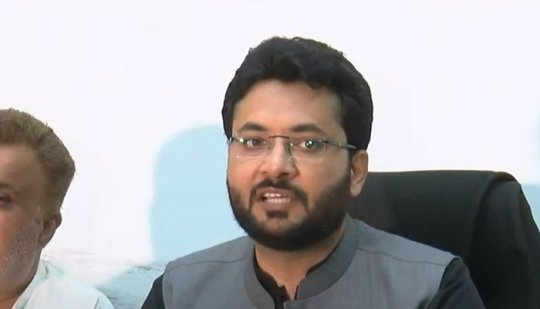
View On WordPress
0 notes
Text
Vice President Election 2022 Mukhtar Abbas Naqvi Arif Mohammad Khan In Race Of NDA Vice President Candidate
Vice President Election 2022 Mukhtar Abbas Naqvi Arif Mohammad Khan In Race Of NDA Vice President Candidate
Vice President Election 2022: देश में उपराष्ट्रपति चुनाव को लेकर गहमागहमी तेज हो गई है. बीजेपी आज संसदीय बोर्ड की बैठक में (BJP Parliamentary Board Meet) उपराष्ट्रपति उम्मीदवार को लेकर अंतिम फैसला ले सकती है. बीजेपी संसदीय बोर्ड की बैठक में पीएम मोदी (PM Modi), बीजेपी के राष्ट्रीय अध्यक्ष जेपी नड्डा, केंद्रीय गृहमंत्री अमित शाह, रक्षा मंत्री राजनाथ सिंह समेत कई दिग्गज नेता शामिल होंगे. उम्मीद…
View On WordPress
0 notes
Text
4k video downloader 라이센스키 크랙 4.21
안녕하세요. 이번 기산에는 4k video downloader 라이센스키 크랙 4.21 받는 방법에 대해서 안내 하겠습니다.
물론 오류나 바이러스 전혀 없으니, 걱정안하셔도 됩니다. 사용법에 대해서 추천 합니다.
1. '4k video downloader crack download' 왼쪽 눌러서 크랙 파일은 받습니다.
2. 라이센스키가 포함되어있으니, 한글판 입니다.
3. 프리미엄 기능 활성화 가능하며, 라이센스키 제거한 포터블 버전도 이용 가능합니다.
4. mac 맥용 지원 예정이니 걱정마세요.
5. 바이러스 및 오류가 없는걸 테스트 완료 추천 합니다.
6. 4k video downloader 라이센스키 무설치 한글판 버전도 호환 가능하며, 구버전 4.20이나 4.19버전도 실행에 문제 없습니다.




대통령 선거에서 부족 카드를 펼친 BJP는 토요일 부통령 선거를 위해 카드를 엽니다. 국회 본회의는 부통령 후보의 명단을 논의하기 위해 당 본부에서 소집됐다. 이번 총선에서 BJP도 최전방 계급의 어떤 얼굴에도 내기를 걸 수 있다는 논의가 있다.
의미심장하게도 BJP가 ���도하는 NDA는 부통령 선거에서 후보자를 확보하기에 충분한 숫자를 가지고 있습니다. 이 외에도 이번 총선에서도 BJP는 BJD와 YSR 의회와 같은 일부 비의회 야당의 지지를 얻을 것이라고 자신한다.
소식통에 따르면 당 후보의 이름은 국회 이사회 이후 발표될 수 있다고 4k video downloader 라이센스키 크랙 4.21 한다. 동료들에게도 의회 이사회 회의 전이나 도중에 이 결정에 대해 알릴 것입니다.
이러한 이름도 논의됩니다.
부통령 후보에 대해 많은 이름이 논의되고 있습니다. 최근 소수자 복지부에서 사임한 Mukhtar Abbas Naqvi, 케랄라 주지사 Arif Mohammad Khan도 지명되고 있습니다. 이 순서에서는 West Bengal 주지사 Jagdeep Dhankhar의 이름도 논의됩니다.
영국에서 총리직을 위한 경쟁이 진행되면서 보리스 존슨 총리는 리시 수낙에 반대하는 지지자들 사이에서 분위기를 조성하기 시작했다. 언론 보도에 따르면, 그는 지지자들에게 누구라도 지지해달라고 요청했지만 Sunak은 지지하지 않았습니다.
집권 보수당 대표로 7월 7일 사임한 존슨 총리는 후퇴하는 지도자들과 만나 수낙을 지지하지 말라고 설득하고 있다. 더 타임즈의 보도에 따르면 존슨은 리시가 사임하고 당내에서 자신에게 불리한 분위기를 조성한 것에 대해 리시를 비난하고 있습니다. 앞서 4k video downloader 라이센스키 크랙 4.21 존슨 총리는 경선에서 어떤 지도자도 지지하지 않을 것이며 그 과정에 간섭하지 않을 것이라고 발표했습니다.
Johnson은 Liz Truss 국무장관을 위한 분위기를 조성하고 있습니다. 그의 든든한 지지자 Jacob Rees Mogg와 Nadine Doris가 그를 위해 캠페인을 벌이고 있습니다. 그는 Sunak보다 Penny Mordont 차관 무역 장관을 받아들일 준비가 되어 있습니다. 이제 전 총리와 그의 캠프는 '리시를 제외한 모든 사람' 캠페인을 운영하고 있습니다.
1 note
·
View note
Photo
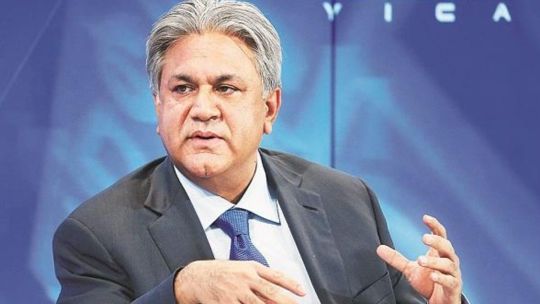
Arif Naqvi stole $100million from Bill Gates
Arif Naqvi, the CEO of the Abraaj Group, a now-defunct private equity business with operations on six continents, was accused of stealing $780 million from the firm’s finances, including a $100 million investment from the Gates Foundation.
In September 2017, Naqvi gave a speech in New York to seek billions of dollars for a new fund. He was detained at Heathrow Airport in April 2019 for his participation in a multimillion-dollar scam. In January of this year, a UK judge ordered Naqvi’s extradition to the US, where he faces up to 291 years in prison.
In September 2017, Naqvi gave a speech in New York to seek billions of dollars for a new fund. He was detained at Heathrow Airport in April 2019 for his participation in a multimillion-dollar scam. In January of this year, a UK judge ordered Naqvi’s extradition to the US, where he faces up to 291 years in prison.
How Arif Naqvi Robbed Bill Gates:
He founded Abraaj Group in 2003 after obtaining $118 million, primarily from Middle Eastern governments, to combat world poverty.
Arif Naqvi was invited to a Presidential Summit on Entrepreneurship in 2010 by then-US President Barack Obama and 250 other Muslim leaders.
During his keynote presentation, he emphasized the necessity of impact investment and how a billion children will require training and employment in the next decades.
“It can only happen via entrepreneurship,” Naqvi told the Summit. The US government invested $150 million in Abraaj Group two months later.
Arif Naqvi also took over K-Electric in 2008. While he increased the company’s profitability, he also lay off nearly 6,000 people, sparking protests against him. While under pressure at home, he diverted attention away from himself by making large philanthropic donations to the West.
He spoke in Davos and other such conferences regularly, where he established friends with Bill Gates, who was also the honoree at a dinner at Naqvi’s house in 2012.
The Gates Foundation contributed $100 million to the Abraaj Growth Markets Health Fund, which aims to enhance hospitals and clinics in developing countries. Following in the footsteps of wealthy benefactors such as Bill Gates, other investors contributed an extra $900 million to the fund.
In actuality, Arif Naqvi abused his stake in Abraaj Group by using a “secretive treasury account.” The majority of Abraaj Group workers were unaware of the hidden account since the equity business was made up of over 300 entities, the majority of which were domiciled in tax havens throughout the world.
Most of the time, the account was nearly empty. Because authorities required millions of dollars to be kept in the account for emergencies, Arif Naqvi and his colleagues transferred money into the account shortly before the end of each quarter to make it appear to have the appropriate amount. A few days later, they drained the account once more.
In a Ponzi scheme scam, Arif Naqvi and his associates also regularly exploited one fund to pay dividends on another.
On January 9, 2014, a manager of one of Abraaj Group’s funds’ finance department warned Naqvi that the business will have a $100 million shortfall by January 15, 2014. Instead of telling the investors the truth, Naqvi chose the route of deception and claimed that everything was proceeding as planned.
In 2015, he not only rewarded himself $53.75 million, but he also defrauded investors by retaining $154 million from the sale of shares.
Soon after, Andrew Farnum, the fund manager at the Gates Foundation, became suspicious as the Abraaj Group continued to seek Bill Gates for hundreds of millions of dollars in fresh investment while paying no returns on the prior investment.
Andrew Farnum sent an email to Arif Naqvi in September 2017, requesting him to disclose the location of Bill Gates’ latest investment and show that he wasn’t abusing one of the world’s wealthiest men’s money.
Naqvi’s response was just vague pledges and outdated bank statements.
A week later, an unnamed Abraaj Group employee delivered an incriminating e-mail to all of the firm’s investors, disclosing the organization’s fraudulent operations.
The email broke investors’ trust in Abraaj Group, and they requested that Arif Naqvi refund their money. A forensic accounting team was engaged by the Gates Foundation to look into Abraaj’s accounts.
While Arif Naqvi, who is now under house arrest in London, awaits the outcome of his appeal against extradition to the United States, where he faces up to 291 years in prison, he maintains his innocence and denies any involvement.
Published in Lahore Herald #lahoreherald #breakingnews #breaking
#arif naqvi#arif naqvi bill gates#Arif Naqvi Robbed Bill Gates#Arif Naqvi stole Bill Gates#bill gates#Business#Latest
0 notes
Photo
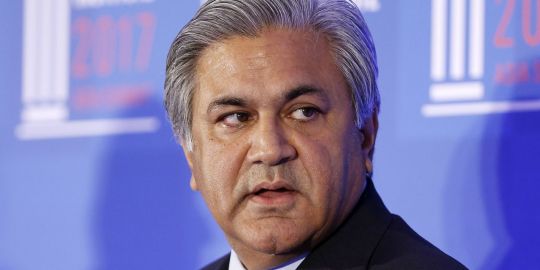
Abraaj Liquidators Sue Fund Backed by Gates Foundation Liquidators of bankrupt private-equity firm Abraaj Group are suing to claw back money from a health-care fund backed by investors including the Bill and Melinda Gates Foundation.
#Abraaj Group#alternative investments#Arif Naqvi#bankruptcy#Bill Gates#Chris Rowland#corporate#corporate actions#corporate crime#corporate financial difficulty#crime#financial services#financial vehicles#funds#Gates Foundation#general news#Hamid Jafar#health care#industrial news#investing#legal action#life sciences#political#private equity#securities#Simon Conway#trusts
0 notes
Text
UK magistrate's court to rule on Arif Naqvi case weeks after blocking Assange's extradition to US - Proiqra
UK magistrate’s court to rule on Arif Naqvi case weeks after blocking Assange’s extradition to US – Proiqra
Pakistani business magnate, The Abraaj Group founder Arif Naqvi. The News/via Geo.tv/Files
LONDON: In the latest development in the Abraaj Group founder Arif Naqvi’s case, the Westminster Magistrate’s Court is set to rule soon whether the Pakistani business magnate would be extradited to the United States or not, weeks after a similar request for Wikileaks founder Julian Assange was blocked.
The…
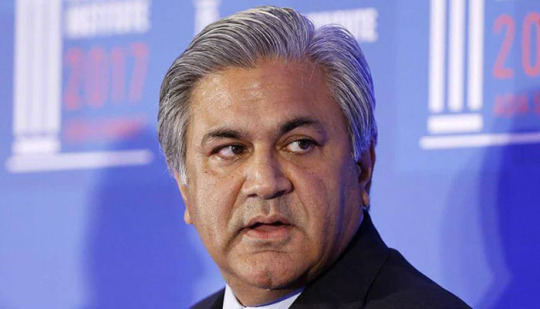
View On WordPress
0 notes
Photo

- SOLD - Swamp Forest, Collection: S. Ribbe,, Wolfgang Schmidt
Swamp Forest - Sumpfwald Sincerely to: Andy Hall, Sheikha Al Mayassa bint Hamad bin Khalifa Al-Thani, Paul Allen, Edythe L. and Eli Broad, Rosa and Carlos de la Cruz, Patricia and Gustavo Phelps de Cisneros (Venezuela and Dominican Republic), Donald and Mera Rubell, Steven A. Cohen, Theo Danjuma, Maria Baibakova, Adrian Cheng, Ingvild Goetz (München), Victoria and David Beckham, Leonardo Dicaprio, Alan Lau, Camilla Barella, Ralph DeLuca, Arthur de Ganay, Ramin Salsali, Moises Cosio, Pedro Barbosa, Monique and Max Burger, Joaquin Diez-Cascon, Luciano Benetton, Roman Abramovich and Dasha Zhukova (Russia), Robbie Antonio (Philippines), Hélène and Bernard Arnault (France), Maria and Bill Bell (United States), Peter Benedek (United States), Debra and Leon Black (United States), Christian and Karen Boros (Germany), Irma and Norman Braman (United States), Peter Brant (United States), Basma Al Sulaiman, Marc Andreessen, Laura and John Arnold, Camilla Barella, Swizz Beatz, Claudia Beck, Andrew Gruft, Robert and Renée Belfer, Lawrence Benenson, Frieder Burda (Germany), Richard Chang (United States), Kim Chang-il (Korea), David Chau and Kelly Ying (China), Pierre T.M. Chen (Taiwan), Adrian Cheng (China), Kemal Has Cingillioglu (United Kingdom), Nicolas Berggruen, Jill and Jay Bernstein, Ernesto Bertarelli, James Brett, Jim Breyer, Christian Bührle, Valentino D. Carlotti, Edouard Carmignac, Trudy and Paul Cejas, Dimitris Daskalopoulos (Greece), Zöe and Joel Dictrow (United States), George Economou (Greece), Alan Faena (Argentina), Mark Falcone and Ellen Bruss (United States), Amy and Vernon Faulconer (United States), Howard and Patricia Farber (United States), Larry and Marilyn Fields (United States), Marie Chaix, Michael and Eva Chow, Frank Cohen, Michael and Eileen Cohen, Isabel and Agustín Coppel, Anthony D'Offay, Hélène and Michel David-Weill, Antoine de Galbert, Ralph DeLuca, Amanda and Glenn Fuhrman (United States), Danielle and David Ganek (United States), Ken Griffin (United States), Agnes Gund (United States), Steven and Kathy Guttman (United States), Andrew and Christine Hall (United States), Lin Han (China), Henk and Victoria de Heus-Zomer (Holland), Grant Hill (United States), Maja Hoffmann (Switzerland), Erika Hoffmann-Koenige (Germany), Tiqui Atencio Demirdjian, Beth Rudin DeWoody, Eric Diefenbach and JK Brown, David C. Driskell, Mandy and Cliff Einstein, Rebecca and Martin Eisenberg, Ginevra Elkann, Tim and Gina Fairfax, Dana Farouki, Michael and Susan Hort (United States), Guillaume Houzé (France), Wang Jianlin (China), Dakis Joannou (Greece), Alan Lau (China), Joseph Lau (China), Melva Bucksbaum and Raymond Learsy (United States), Agnes and Edward Lee (United Kingdom), Aaron and Barbara Levine (United States), Adam Lindemann (United States), Eugenio López (Mexico), Jho Low (China), Susan and Leonard Feinstein, Nicoletta Fiorucci, Josée and Marc Gensollen, Alan and Jenny Gibbs, Noam Gottesman, Florence and Daniel Guerlain, Paul Harris, Barbara and Axel Haubrok, Alan Howard, Fatima and Eskandar Maleki (United Kingdom), Martin Margulies (United States), Peter Marino (United States), Donald Marron (United States), David MartÍnez (United Kingdom and Mexico), Raymond J. McGuire (United States), Rodney M. Miller Sr. (United States), Simon and Catriona Mordant (Australia), Arif Naqvi (United Kingdom), Peter Norton (United States), Shi Jian, Elton John, Tomislav Kličko, Mo Koyfman, Jan Kulczyk, Svetlana Kuzmicheva-Uspenskaya, Pierre Lagrange, Eric and Liz Lefkofsky, Robert Lehrman, François Odermatt (Canada), Bernardo de Mello Paz (Brazil), José Olympio & Andréa Pereira (Brazil), Catherine Petitgas (United Kingdom), Victor Pinchuk (Ukraine), Alden and Janelle Pinnell (United States),Ron and Ann Pizzuti (United States), Michael Platt (Switzerland), Miuccia Prada and Patrizio Bertelli (Italy), Howard and Cindy Rachofsky (United States), Mitchell and Emily Rales (United States), Dan Loeb, George Lucas, Ninah and Michael Lynne, Lewis Manilow, Marissa Mayer, David Mirvish, Lakshmi Mittal, Valeria Napoleone, John Paulson, Amy and John Phelan, Ellen and Michael Ringier (Switzerland), David Roberts (United Kingdom), Hilary and Wilbur L. Ross Jr. (United States), Dmitry Rybolovlev (Russia), Lily Safra (Brazil),Tony Salamé (Lebanon), Patrizia Sandretto (Italy), Eric Schmidt (United States), Alison Pincus, Heather Podesta, Colette and Michel Poitevin, Thomas J. and Margot Pritzker, Bob Rennie, Craig Robins, Deedie and Rusty Rose, Stephen Ross, Alex Sainsbury, Alain Servais (Belgium), Carlos Slim (Mexico), Julia Stoschek (Germany), Budi Tek (Indonesia), Janine and J. Tomilson Hill III (United States), Trevor Traina (United States), Alice Walton (United States), Robert & Nicky Wilson (United Kingdom), Elaine Wynn (United States), Lu Xun (China), Muriel and Freddy Salem, Denise and Andrew Saul, Steven A. Schwarzman, Carole Server and Oliver Frankel, Ramin Salsali, David Shuman, Stefan Simchowitz, Elizabeth and Frederick Singer, Jay Smith and Laura Rapp, Jeffrey and Catherine Soros, Jerry Yang and Akiko Young (United States), Liu Yiqian and Wang Wei (China), Anita and Poju Zabludowicz (United Kingdom), Jochen Zeitz (South Africa), Qiao Zhibing (China), Jerry Speyer and Katherine G. Farley, Susana and Ricardo Steinbruch, Kai van Hasselt, Francesca von Habsburg, David Walsh, Artur Walther, Derek and Christen Wilson, Michael Wilson, Owen Wilson, Zhou Chong, Doris and Donald Fisher, Ronnie and Samuel Heyman, Marie-Josee and Henry R. Kravis, Evelyn and Leonard Lauder, Jo Carole and Ronald S. Laude, Francois Pinault (France), Udo Brandhost (Köln), Harald Falckenberg (Hamburg), Anna and Joseph Froehlich (Stuttgart), Hans Grothe (Bremen), UN Knecht (Stuttgart), Arendt Oetker (Köln), Inge Rodenstock (Grünwald), Ute and Rudolf Scharpff (Stuttgart), Reiner Speck (Köln), Eleonore and Michael Stoffel (Köln), Reinhold Würth (Niedernhall), Wilhelm and Gaby Schürmann, Ivo Wessel, Heiner and Celine Bastian, Friedrich Karl Flick, Monique and Jean-Paul Barbier-Mueller (Genf), Christa and Thomas Bechtler (Zürich), David Bowie (Lausanne), Ulla and Richard Dreyfus (Binningen und Gstaad), Georges Embiricos (Jouxtens and Gstaad), Friedrich Christian "Mick" Flick (Hergiswil and Gstaad), Esther Grether (Bottmingen), Donald Hess (Bolligen), Elsa and Theo Hotz (Meilen), Baroness Marion and Baron Philippe Lambert (Genf), Gabi and Werner Merzbacher (Zürich), Robert Miller (Gstaad), Philip Niarchos (St. Moritz), Jacqueline and Philippe Nordmann (Genf), Maja Oeri and Hans Bodenmann (Basel), George Ortiz (Vandoeuvres), Graf and Gräfin Giuseppe Panza di Biumo (Massagno), Ellen and Michael Ringier (Zürich), Andrew Loyd Webber, Steve Martin, Gerhard Lenz, Elisabeth and Rudolf Leopold.
https://www.saatchiart.com/art/Drawing-SOLD-Swamp-Forest-Collection-S-Ribbe/694205/2784259/view
7 notes
·
View notes
Text
BJP Minority Morcha is the Official minority wing of the Bharatiya Janata Party (B.J.M.M) Bharatiya Janata Minority Morcha ,[1][2] one of two major political parties in India.[3]Prominent party leaders who are members of the minority Morcha include Sikander Bakht, Abdul Alim Khan Mukhtar Abbas Naqvi, Syed Shahnawaz Hussain, M. J. Akbar, Arif Beg, Farooq Khan, Aslam Gurukkal and Asifa Khan,Dr.Haji Ajaz Deshmuk.[4][5] In November 2011, the Minority Morcha asked the party leadership to drop its demand for a Uniform Civil Code, but it stood by the party's stand of opposing any reservation based on religious affiliation.[6] However, in October 2015, the Morcha endorsed the views of Union Law Minister D.V. Sadananda Gowda, who stated that the Uniform Civil Code was necessary.[7]In July 2012, a one-day workshop on "Welfare of Minorities through Good Governance" was held in New Delhi in which members and chairpersons of minority-related government organisations of BJP-ruled states participated. The workshop was inaugurated by the BJP president, who asked the participants to deliver through good governance and win the hearts of the community.[8][9]
1 note
·
View note
Text
I love financial crime and personally if I was a judge I would send those people to prison in inverse correlation with how fun they would be to get a drink with. Bernie Madoff gets a suspended sentences. Arif Naqvi gets twenty years because I'd have fun for the first five hours and then it would DEFINITELY turn into teh worst night of my life. Elizabeth Holmes - forty years. Anna Delvey - five years. Adam Neumann is getting the chair. And original bad boy Jeff Skilling? Superhell.
#please do not take this post seriously#all of these people should actually be in a special jail on the moon where the punishment is that they have to talk to each other.#it's like that satre play except Adam Neumann plays the role of the evil lesbian#*sartre FUCK
0 notes
Text
‘Moment for Imran to come clean’: PML-N’s Zubair dares PTI to sue Financial Times - Pakistan
‘Moment for Imran to come clean’: PML-N’s Zubair dares PTI to sue Financial Times – Pakistan
After British daily Financial Times (FT) published a report investigating how the PTI accrued funds through cricket matches organised under Wootton Cricket Ltd — a company owned by Abraaj Group founder Arif Naqvi — PML-N leader Mohammad Zubair said on Saturday that this was a moment for PTI chief Imran Khan to “come clean” by accounting for his party’s funds and challenging the FT story in a…
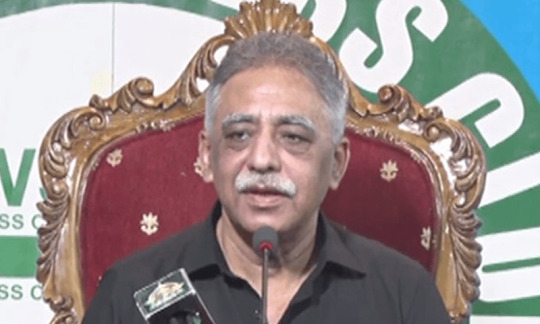
View On WordPress
0 notes
Text
PAKISTAN
Prime Minister Imran Khan Promised ‘New Pakistan’ But Members of His Inner Circle Secretly Moved Millions Offshore
Leak shows a key ally tried to bypass tax authorities and political and military elites bought luxury apartments and set up shell companies.
— By Margot Gibbs and Malia Politzer
— Image: Arif Ali/AFP via Getty Images
— October 3, 2021

Imran Khan at an anti-government rally in Lahore in 2016, shortly after the Panama Papers caused uproar in Pakistan.
In 2018, Imran Khan, the Pakistani cricketing legend turned anti-corruption campaigner finally broke through.
After more than two decades in the political wilderness, the charismatic Oxford-educated media star seized on the publication of the Panama Papers, the 2016 journalistic exposé that revealed the offshore secrets of the global elite. Among the findings: The children of Pakistan’s sitting prime minister secretly owned a string of luxury London apartments.
Riding a wave of public outrage, Khan led protests around the country and a sit-in at the residence of Prime Minister Nawaz Sharif, demanding that he step down. With the support of the military establishment, Khan propelled his reformist party, Pakistan Tehreek-e-Insaf (PTI), or Pakistan Movement for Justice, past its rivals in the 2018 national elections and propelled himself into the prime minister’s office in Islamabad.
In a televised victory speech, Khan promised a new era.
“We will establish supremacy of the law,” he said. “Whoever violates the law, we will act against them. Our state institutions will be so strong that they will stop corruption. Accountability will start with me, then my ministers, and then it will go from there.”
Now leaked documents reveal that key members of Khan’s inner circle, including cabinet ministers, their families and major financial backers have secretly owned an array of companies and trusts holding millions of dollars of hidden wealth. Military leaders have been implicated as well. The documents contain no suggestion that Khan himself owns offshore companies.
Among those whose holdings have been exposed are Khan’s finance minister, Shaukat Fayaz Ahmed Tarin, and his family, and the son of Khan’s former adviser for finance and revenue, Waqar Masood Khan. The records also reveal the offshore dealings of a top PTI donor, Arif Naqvi, who is facing fraud charges in the United States.

Pakistan’s Finance Minister Shaukat Fayaz Ahmed Tarin gestures during a press conference. Image: Farooq Naeem/AFP via Getty Images
The files show how Chaudhry Moonis Elahi, a key political ally of Imran Khan’s, planned to put the proceeds from an allegedly corrupt business deal into a secret trust, concealing them from Pakistan’s tax authorities. Elahi did not respond to ICIJ’s repeated requests for comment. Today, a family spokesman told ICIJ’s media partners that, “due to political victimisation misleading interpretations and data have been circulated in files for nefarious reasons.” He added that the family’s assets “are declared as per applicable law”.
In one of several offshore holdings involving military leaders and their families, a luxury London apartment was transferred from the son of a famous Indian movie director to the wife of a three-star general. The general told ICIJ the property purchase was disclosed and proper; his wife didn’t reply.
The revelations are part of the Pandora Papers, a new global investigation into the shadowy offshore financial system that allows multinational corporations, the rich, famous and powerful to avoid taxes and otherwise shield their wealth. The probe is based on more than 11.9 million confidential files from 14 offshore services firms leaked to the International Consortium of Investigative Journalists and shared with 150 news organizations around the world.
The window into the personal finances of individual Pakistani generals is especially rare and provides a glimpse at how top military officers – known in Pakistan as “The Establishment” – use offshore to quietly enrich themselves while maintaining, until now, the military’s image as a bulwark against civilian corruption.
In the 48 hours leading up to the publication of the Pandora Papers, a Pakistani television station, ARY-News, reported that, “the owner of two offshore companies registered at a similar address as of Prime Minister Imran Khan has revealed that they were registered by him on a different address and denied any role of the premier in this regard.” The story also attributed the information to “a database of the offshore companies.”
ARY-News is not an ICIJ partner and doesn’t have access to ICIJ data.
In its reporting prior to publication, ICIJ had asked Khan about the same companies. A Khan spokesman told ICIJ that the prime minister had no link to either, adding that two houses in the same neighborhood share an address, providing a map as evidence.
The spokesman also told ARY-News that Khan denied any connection to the companies, adding that their owner “never met Imran Khan face to face and it may however be possible that they had attended an extended family function.”
The Pandora Papers investigation exposes civilian government and military leaders who have been hiding vast amounts of wealth in a country plagued by widespread poverty and tax avoidance.
The newly leaked records reveal the use of offshore services by Pakistan’s elites that rivals the findings of the Panama Papers, which led to Sharif’s downfall and helped propel Imran Khan to power three years ago.
Today, a few hours before the Pandora Papers’ publication, Khan’s spokesperson told a press conference that the prime minister, “has no offshore company but if any of his ministers [or] advisers have it will be their individual acts and they will have to be held accountable.”
An Unaccountable Military Elite
Khan’s anti-corruption rhetoric resonated in Pakistan, where the military has pointed to what it calls the corruption and ineptitude of civilian politicians to justify overthrowing democratically elected governments three times since the country’s founding in 1947.
Military autocracies have ruled Pakistan for almost half the country’s history. They have been bolstered by support from the U.S and NATO countries, which have relied on Pakistan’s support as a bulwark against the Soviet invasion of Afghanistan and, later, the Taliban.
The military also claims legitimacy as the nation’s protector against longtime adversary and nuclear rival India.
Over the decades, the military and its secretive spy agency, Inter-Services Intelligence, have repeatedly stoked anti-India animus, even at the cost of angering Pakistan’s Western allies.
Foreign policy analysts have accused the military of playing a double game, receiving billions of dollars in U.S military support while continuing to work with members of the Afghan Taliban.
One legacy of colonial rule is the military’s wealth. The military’s combined business holdings amount to Pakistan’s largest conglomerate, and it controls 12% of the country’s land. Many of the landholdings are owned by current or former senior leaders.
The Pandora Papers reveal that in 2007, the wife of Gen. Shafaat Ullah Shah, then one of Pakistan’s leading generals and a former aide to President Pervez Musharraf, acquired a $1.2 million apartment in London through a discreet offshore transaction.
The property was transferred to Gen. Shah’s wife by an offshore company owned by Akbar Asif, a wealthy businessman who has opened restaurants in London and Dubai. Asif is the son of the Indian film director K Asif. The younger Asif once met with Musharraf at London’s Dorchester Hotel to ask for an exception to Pakistan’s 40-year ban on Indian films to allow the release there of one of his father’s most acclaimed movies. Musharraf granted the exception and later lifted the ban.
The leaked documents show that Asif has owned a multimillion-dollar property portfolio through a web of offshore companies.
One of those companies, called Talah Ltd. and registered in the British Virgin Islands (BVI), was used to transfer the London apartment to Shafaat Shah’s wife. Talah bought an apartment near the Canary Wharf financial district in 2006. The next year, Asif transferred ownership of the company to Fariha Shah.
Asif’s sister, Heena Kausar, is the widow of Iqbal Mirchi, a senior figure in a leading organised crime group, D-company. Mirchi was at the time under sanction as a drug trafficker by the U.S. Before his death in 2013, Mirchi was one of India’s most wanted men.
Gen. Shah told ICIJ that the purchase of the London apartment had been made through a former army colleague then acting as a consultant to London real estate firms, not through any personal connection to Asif. Gen. Shah said the flat “was named” to his wife because “I already had properties in my name while she did not have any and to balance tax deductions.”
Shah said that his wife has never met Asif and that he met him just once, while an aide to Musharaff, when Asif briefly lobbied the president for his father’s film “in the corridors of Dorchester Hotel when he had accompanied the hairstylist, who had come to cut Mrs Musharraf’s hair.”
Insights into the private wealth of top military officers and their families are exceedingly rare; journalists who have written about the military within Pakistan have been jailed, tortured and killed.
The Pandora Papers also reveal that Raja Nadir Pervez, a retired army lieutenant colonel and former government minister, owned International Finance & Equipment Ltd, a BVI-registered company. In the leaked files, the firm is involved in machinery and related businesses in India, Thailand, Russia and China. Records show that in 2003, Pervez transferred his shares in the company to a trust that controls several offshore companies.
One of the trust’s beneficiaries is a British arms dealer. According to U.K. court documents, one of the trust’s other companies has helped broker arms sales from Belgian manufacturer FN Herstal SA to Hindustan Aeronautics Ltd., a state-owned Indian defense company.
While he owned International Finance & Equipment, Pervez also held several high-level positions in Pakistan’s government. He was elected to the National Assembly in 1985 and later joined Khan’s party. Pervez did not respond to reporters’ questions.
Another influential former military leader who shows up in the leaked documents is Maj. Gen. Nusrat Naeem, the ISI’s onetime director general of counterintelligence. He owned a BVI company, Afghan Oil & Gas Ltd, that was registered in 2009, shortly after his retirement. He said that the company had been set up by a friend and that he didn’t use it for any financial transactions.
Islamabad police later charged Naeem with fraud related to the attempted purchase of a steel mill for $1.7 million. The case was dropped.
The Pandora Papers also bring to light the notable offshore holdings of close relatives of three senior military figures.
Umar and Ahad Khattak, sons of the former head of Pakistan’s air force, Abbas Khattak, in 2010 registered a BVI company to invest what documents call “family business earnings” in stocks, bonds, mutual funds and real estate.
The Khattaks did not respond to reporters’ questions.
In an example involving intergenerational wealth transfer, Shahnaz Sajjad Ahmad inherited a fortune from her father, a retired lieutenant general, through an offshore trust that owns two London apartments, purchased in 1997 and 2011 in Knightsbridge, a short walk from Harrods. She, in turn, set up a trust for her daughters in 2003 in Guernsey, a tax haven in the English Channel. Her father was a favorite of Field Marshal Mohammad Ayub Khan, the country’s first military dictator (1958-1969). After her father retired from the army, he founded one of Pakistan’s biggest business conglomerates. Ayub Khan’s son later married into the family and sits on the boards of several of the group’s businesses.
Shahnaz did not respond to ICIJ’s requests for comment.
Taken together, the findings offer a portrait of an unaccountable military elite with extensive personal and family offshore holdings.
‘A Defining Moment’
As Pakistan’s ultimate political arbiter, the military would eventually test Imran Khan’s reformist ideals.
Born in 1952, Khan was the son of a Lahore civil engineer, and he enjoyed the privileges of Pakistan’s insular, and insulated, upper class. When the electricity failed, elites could turn on generators. If hospitals were substandard, they flew abroad for care.
“I was from that privileged class that was not affected by the general deterioration in the country,” Khan wrote in his 2011 autobiography, “Pakistan: A Personal History”.
Khan’s elite boarding school, Aitchison College, was named for the colonial administrator who founded it. Lessons were in English; boys caught speaking Urdu during school hours were fined.
The education system replicated colonial values, Khan wrote, teaching elites that they should “look upon the masses with contempt” and that “the natives were not to be trusted.”
As a young man, he befriended future leaders of Pakistan, meeting Nawaz Sharif at a cricket club, stopping by for Sunday cheese and canape parties at the Oxford University lodgings of another future Pakistani prime minister, Benazir Bhutto. He also developed a reputation as a playboy and a denizen of London’s nightclubs.
Khan played his first cricket match for Pakistan’s national team in 1971, when he was just 18, became captain at the age of 29 and, 10 years later, led the team to victory in the 1992 World Cup.
In a country passionate about cricket, Khan’s athletic feats made him a national hero – and drew the attention of politicians hoping to capitalize on his popularity. Two of the Pakistan’s military leaders – Generals Musharraf and Muhammad Zia-ul-Haq – and Sharif, the three-time civilian prime minister, invited him to join their governments. He refused them all, later declaring in his autobiography that each administration was either incompetent or corrupt.

A Pakistani driver looks on as a poster of cricketer-turned-politician, Imran Khan, is seen on his rickshaw in Rawalpindi, ahead of the 2018 general elections. Image: Farooq Naeem/AFP via Getty Images
He wrote that he entered politics after the experience of building a cancer hospital in his mother’s memory in 1994 left him stunned both by the generosity of ordinary Pakistanis and the failings of their government: “I discovered how hard it was to achieve anything in Pakistan while also battling bureaucracy and corruption.”
In 1996, Khan founded the PTI party, vowing to root out corruption, address wealth inequality and break the hold of the country’s two political dynasties – those of the Bhutto and Sharif families – which he claimed ruled Pakistan like a “fiefdom.”
Among the early targets of Khan’s anti-corruption campaign was another powerful family, the Elahis, known in Pakistan as the Chaudhrys of Gujrat.
After Musharraf forcibly ousted Prime Minister Sharif in 1999, during his second term, Chaudhry Pervaiz Elahi, a prominent political figure, organized the Pakistan Muslim League-Q to support the coup. The PML-Q, known for backing Pakistan’s military governments, remains closely aligned with the military.
Over the years Pakistan’s anti-corruption agencies have launched and dropped several investigations into his business dealings. Around 2002, Khan petitioned the national bank to investigate loans to Elahi’s company which had allegedly been written off. At one point he called him “the biggest dacoit in Punjab,” using an Urdu word for “bandit.”
Despite being a national hero and benefiting from well-funded campaigns powered by the enthusiastic support of Pakistanis abroad, Khan remained a political outsider, in part because he refused to make alliances with forces he called corrupt.
Middle-class and other reform-minded voters flocked to his 2013 campaign, waving cricket bats. And Khan gained a powerful ally: the military, then in a power struggle with both mainstream civilian factions. But the PTI gained just 35 of the 342 seats in the National Assembly that year.
Then Came The Panama Papers.
The revelations about then-Prime Minister Sharif and his family’s London real estate holdings, followed by the discovery that his oldest daughter forged documents in an attempt to cover up her ownership, played perfectly to Khan’s anti-corruption message and turbocharged his political fortunes.
“’The leaks are God-sent,” Khan said at the time. Taking stock of the impact on the country’s ruling elite a year later, he declared, “This is a defining moment in the history of Pakistan.”
Pakistan’s Supreme Court soon disqualified Sharif from office for falling short of constitutional requirements to be “truthful and trustworthy.” The ISI was involved in the investigation of Sharif. He was later sentenced to 10 years in prison on related corruption charges.
In the 2018 elections, Khan’s PTI secured a fourfold increase in National Assembly seats, bringing the party to the brink of power. Throngs of his supporters danced outside the party’s headquarters in Islamabad.
But Khan hadn’t won the outright majority and needed to form a government. Sharif and Bhutto’s parties, the target of years of his attacks, were not an option.
That left a coalition of smaller parties, led by the Pakistan Muslim League-Q, the Elahis’ party. Khan made the deal.
A Fateful Political Alliance
Since taking office, Khan has continued to deploy anti-corruption rhetoric and rail against elites who, he has said on Twitter, “come to power and plunder the country.”
But analysts say Khan has disappointed his reform-minded supporters and has become widely viewed as a figurehead. “He doesn’t have a problem with the military ruling the country while they pretend that he’s in charge,” Aqil Shah, a visiting academic at the Carnegie Endowment for International Peace,told ICIJ.
Khan’s spokesperson, Shabhaz Gill, told ICIJ that the “PTI believed in the separation of powers,” and the military came under the power of the executive branch of the state.
The Pandora Papers reveal that Khan has surrounded himself with people – cabinet ministers and their families, donors and other political allies – who have holdings hidden offshore.
Shaukat Tarin, Khan’s finance minister, and members of Tarin’s family, own four offshore companies. According to Tariq Fawad Malik, a financial consultant who handled the paperwork on the companies, they were set up as part of the Tarin family’s intended investment in a bank with a Saudi business. He said that, “as a mandatory prerequisite by [the] regulator, we engaged with the Central Bank of Pakistan to obtain their ’in-principle’ approval for the said strategic investment.” The deal didn’t proceed.
Tarin didn’t respond to ICIJ’s questions. In a statement issued the day of the Pandora Papers’ publication, Tarin said: “The off-shore companies mentioned were incorporated as part of the fund raising process for my Bank.”
Omer Bakhtyar, the brother of Khan’s minister for industries, Makhdum Khusro Bakhtyar, transferred a $1 million apartment in the Chelsea area of London to his elderly mother through an offshore company in 2018. The state anti-corruption agency has been investigating allegations that his family’s wealth inexplicably “ballooned” since Bhaktyar first became a minister in Pervez Musharaff’s government in 2004.
In a written statement to ICIJ, Makhdum Bakhtyar said that the anti-corruption agency’s investigation was founded on baseless allegations which had underestimated his family’s past wealth, and that it has so far not resulted in a formal complaint.
The son of Waqar Masood Khan, Khan’s chief adviser for finance and revenue between 2019 and 2020, co-owned a company based in the British Virgin Islands. Masood resigned in August amid a policy dispute. Khan told ICIJ that he did not know what his son’s company did. He said his son lived a modest life, and was not his financial dependent.
And Khan’s former minister for water resources, Faisal Vawda, set up an offshore company in 2012 to invest in U.K. properties, the Pandora Papers show. He resigned in March amid a controversy over his status as a dual U.S.-Pakistan national. Vawda told ICIJ that he has declared all worldwide assets held in his name to Pakistani tax authorities.
Gill, Khan’s spokesperson, said that Khan had passed an executive order requiring unelected members of his cabinet to declare their assets, in addition to the asset disclosures already required of members of the National Assembly under Pakistani law.
Khan’s financial backers are also prominent in the files.
Naqvi, the financier and major donor to Khan’s 2013 campaign, owned several offshore companies. The files show that in 2017, Naqvi transferred ownership of U.K. holdings – three luxury apartments, his country estate and a property in London’s suburbs – into an offshore trust operated by Deutsche Bank. Deutsche Bank declined to respond to ICIJ’s concerning the beneficiaries of the trust.
The next year, he presided over the spectacular collapse of his Dubai-based private equity firm, Abraaj Group.
U.S prosecutors charged Naqvi with engineering a $400 million fraud against Abraaj investors and this year persuaded a court to allow his extradition from the U.K. Naqvi has denied wrongdoing.
Tariq Shafi, a leading businessman and another PTI donor, held $215 million through offshore companies, the records show.
Neither Shafi nor Naqvi responded to ICIJ’s questions.
The documents offer an unusually detailed look at how a top political figure attempted to hide proceeds from an alleged misuse of public funds with the help of an elite offshore service provider.
The politician is Moonis Elahi, whose father founded the Pakistan Muslim League-Q, the party holding Khan’s fragile coalition together.
‘Several Corrupt Land Development Projects’
Scandals linked to the Elahi family have become a regular feature of Pakistani politics over the years, but have rarely resulted in legal consequences.
In 2007, for instance, authorities found that the Bank of Punjab, owned by the Elahi-led provincial government, had made a reported $608 million in unsecured loans, many to companies owned by the bank’s directors or people with political connections. When the loans went bad, the provincial government ultimately paid to bail out the bank.
In January 2016, Moonis Elahi, then a member of Punjab’s provincial legislature, met with officials at Asiaciti Trust, a financial services provider that specializes in offshore wealth management. Records show that Elahi told Asiaciti staff that he wanted to invest money from the 2007 sale of land owned by Phalia Sugar Mills, an Elahi family business.
The records show that Asiaciti officials asked Elahi about his past legal problems. He provided them with a court document clearing him of fraud charges unrelated to the Bank of Punjab scandal.
After the meeting, documents show, Asiaciti designated Elahi as a “politically exposed person” or PEP — a legal term denoting a corruption risk related to a client’s status as a public official.
Singapore’s anti-money-laundering laws require that management at professional firms like Asiaciti approve any business done with PEPs. The firms also have to establish the source of a PEP’s wealth and of the specific funds to be invested, and they have to take other steps to guard against money laundering.
Asiaciti commissioned Thomson Reuters Risk Management Solutions,a unit of the financial information giant, to conduct an “enhanced due diligence” check.
Thomson Reuters produced a 19-page report detailing allegations of Elahi’s involvement in “several corrupt land development projects,” including that he set up a fake company, fraudulently obtained loans and sold land at inflated prices to government agencies.
The report noted that the Bank of Punjab had filed a complaint with Pakistan’s anti-corruption agency against the Elahi family, alleging that under the “influence” of Moonis Elahi’s father, the bank had made an illegal loan to the buyer of the family’s Phalia Sugar Mills property.
On Feb. 15, 2016, records show, Asiaciti accepted Moonis Elahi as a client, despite the report’s findings.
Elahi provided Asiaciti with the contract from the $33.7 million Phalia Sugar Mills sale as the source of the funds he wanted to invest, records show. In other words, Elahi asked Asiaciti to invest the proceeds of an allegedly corrupt loan obtained from a state-owned bank.
The records don’t say whether Asiaciti asked about the Bank of Punjab’s allegations. The bank did not respond to questions from ICIJ’s partner, The Guardian, about the loan, including what became of its complaint the anti corruption agency, citing client confidentiality.
A spokesperson for Asiaciti said that the firm maintained a strong compliance program, and that their offices have all passed audits for anti-money laundering and counter terrorism financing practices.
“However, no compliance program is infallible – and when an issue is identified, we take necessary steps with regard to the client engagement and make the appropriate notifications to regulatory agencies,” the spokesperson said.
They said that ICIJ’s reporting was based on incomplete information but declined to elaborate.
Asiaciti registered a trust in low-tax Singapore and proposed to use part of the proceeds of the Phalia Sugar deal to invest in another Punjab sugar company, RYK Mills, in which Elahi already held a stake.
The plan called for a trust to hold an investment vehicle, funded by the “sale of a sugar mill,” that would own two properties in the U.K.
But, records show, when Asiaciti advised Elahi of its legal obligation to share his “financial information with the relevant tax authorities” – in this case, Pakistan’s Federal Board of Revenue – he balked.
Records show that Asiaciti received a phone call from Elahi. He wanted to scrap the trust.
“Moonis,” an Asiaciti manager wrote in a memo, “has concerns about the … reporting requirements.”
According to the memo, Elahi preferred to hold the investments in a U.K.-registered trust in his wife’s name; as a U.K. tax resident, she would not be subject to the same disclosure requirements.
“It appears that Moonis has no connection” to that trust, the memo says.
Less than a month after the phone call, Asiaciti prepared the paperwork to terminate Elahi’s trust. The following year, public records show, Elahi’s wife used a U.K. shell company to transfer an $8.2 million London apartment overlooking the River Thames to a woman named Mahrukh Jahangir, who then filed a U.K. Land Registry document generally used by joint owners and trustees. The transfer was not for “money or anything of monetary value,” according to public records.
A woman with the same name as Jahangir appears as a 9.4% shareholder in the RYK Mills – the business targeted as an investment in Elahi’s talks with Asiaciti. ICIJ tried to contact Jahangir for comment but did not receive a response.
Neither Elahi nor his wife disclosed ownership of the apartment or RYK assets in their official declaration of interests from 2017 as part of his candidacy to become a member of the National Assembly.
The Elahi family have ignored multiple attempts to seek comment concerning the allegations concerning the Phalia Mills sale, Moonis Elahi’s dealings with Asiaciti, or the U.K. based trust he intended to set up.
A New Minister
In April, Pakistan’s Federal Investigations Agency announced a criminal probe into price fixing in the powerful sugar industry, naming RYK Sugar Mills among the companies allegedly involved.
The industry dominates the valuable agricultural land of Punjab and is one of the biggest water users in one of the most water-stressed countries in the world. It is also among the world’s largest producers of sugarcane and uses enough water each year to fill Australia���s Sydney Harbour more than 45 times.
On Twitter, Elahi acknowledged that he “indirectly” held shares in RYK Mills, though he wasn’t involved in the company’s management.
Responding to news of the criminal probe, Khan, in a speech, called out the “sugar mafia,” which he characterized as a “powerful elite” that set itself above the rule of law and frequently sought to “blackmail the government.”
In June, Khan announced a new appointment to his cabinet: He named Moonis Elahi minister for water resources.
Additional reporting: David Conn, Shah Meer Baloch
0 notes